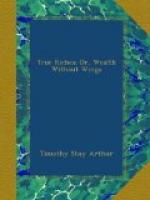“Oh! Preposterous!” Grind forced a laugh. “That’s only an afterthought.”
“Is it. Hark!” Martin bent close to his ear, and uttered a few words in an undertone. Grind started as if stung by a serpent.
“Wretch!”
“It is useless to call ill names, my friend. I have you in my power; and I mean to keep you there. But I shall not be very hard on you. So, don’t look so awfully cut down.”
For once the scheming, unscrupulous lawyer found himself outwitted. His tool had proved too sharp for him. Without a doubt he was in his power to an extent by no means agreeable to contemplate. Grind now saw that conciliation was far better than antagonism.
When Martin retired from the lawyer’s office, he had in his pocket a check for two hundred dollars, while behind him was left his solemn pledge to leave the city for New Orleans the next day. The pledge, when given, he did not intend to keep; and it was not kept, as Grind soon afterward learned, to his sorrow. A drunkard and a gambler, it did not take Martin long to see once more the bottom of his purse. Not until this occurred did he trouble the lawyer again. Then he startled him with a second visit, and, after a few sharp words, came off with another check, though for a less amount.
And for years, leech-like, Martin, sinking lower and lower all the time, continued his adhesion to the lawyer, abstracting continually, but in gradually diminishing sums, the money needed for natural life and sensual indulgence, until often his demands went not above a dollar. Grind, reluctantly as he yielded to these demands, believed it wiser to pay them than to meet the exposure Martin had it in his power to make. And so it went on, until, one day, to his inexpressible relief, Grind read in the morning papers an account of the sudden and violent death of his enemy. His sleep was sounder on the night that followed than it had been for a long, long time.
Of Edward Claire, and his happy family—not happy merely from an improved external condition, for the foundation of their happiness was laid in a deeper ground—we have not much to relate.
When Claire brought to Fanny the title-deeds of the property which he had recovered from Jasper, she pushed them back upon him, saying, as she did so—
“Keep them, father—keep them. All is yours.”
“No, my dear child,” replied Claire, seriously, yet with tenderness and emotion, “all is not mine. All is yours. This property, through a wise Providence, has come into your possession. I have no right to it.”
“If it is mine, father,” said Fanny, “have I not a right to do with it what I please?”
“In a certain sense you have.”
“Then I give it all to you—you, my more than father!”
“For such a noble tender, my dear child, I thank you in the very inmost of my heart. But I cannot accept of it, Fanny.”
“Why not, father? Why not? You have bestowed on me more than wealth could buy! I know something of what you have borne and suffered for me. Your health, now impaired, was broken for me. Oh, my father! can I ever forget that? Can I ever repay you all I owe? Were the world’s wealth mine, it should be yours.”




